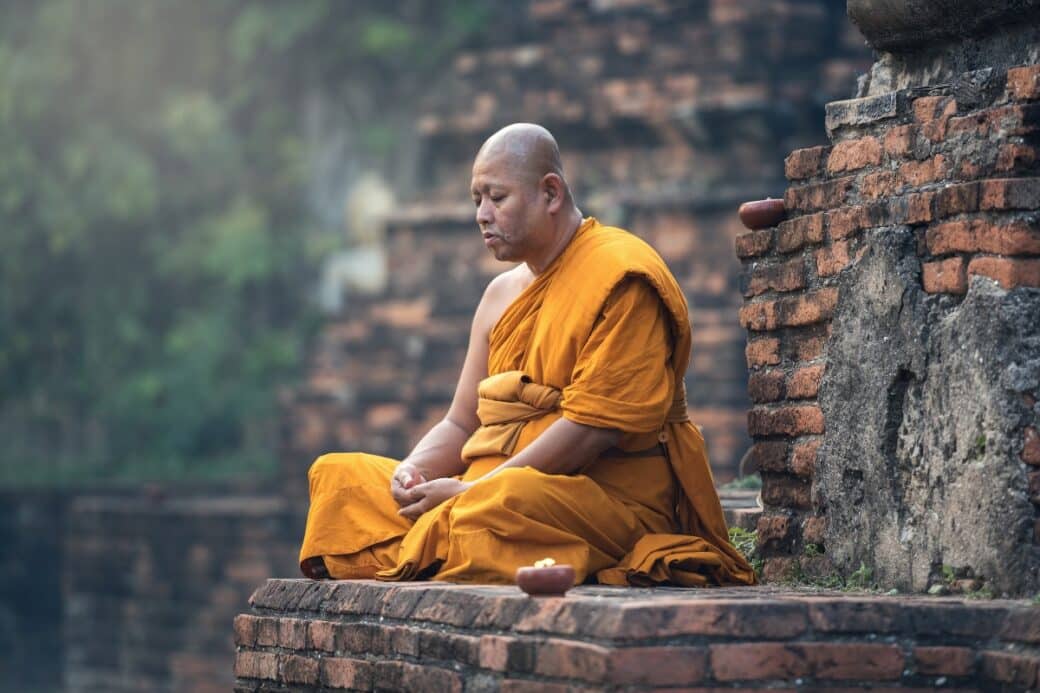You’ve probably heard about meditation, but have you ever wondered whether it’s just a hobby or a spiritual journey? In this article, we will explore the different perspectives on meditation and delve into its profound effects on the mind, body, and soul. Whether you view it as a simple leisure activity or a profound spiritual practice, there’s no denying that meditation has the potential to transform your life. So, join us on this journey as we uncover the true essence of meditation and its significance in finding inner peace and harmony.

Understanding The Concept Of Meditation
Definition of Meditation
Meditation, in its simplest form, can be defined as the practice of training the mind to focus and redirect one’s thoughts. It is a practice that has been around for thousands of years and is rooted in various religious and spiritual traditions. Through meditation, individuals aim to achieve a state of calm and mental clarity, often by concentrating on their breath or a specific mantra.
Different Types of Meditation
There are numerous types of meditation, each with its unique techniques and practices. Some of the most common types include:
- Mindfulness Meditation: This form of meditation involves focusing on the present moment and observing one’s thoughts and sensations without judgment.
- Loving-Kindness Meditation: Also known as metta meditation, this practice involves cultivating feelings of love, compassion, and kindness towards oneself and others.
- Transcendental Meditation: This technique involves the use of a mantra or a repeated word or phrase to quiet the mind and achieve a deep state of relaxation.
- Guided Visualization: In guided visualization, individuals are led through a guided meditation script, often to imagine positive scenarios or outcomes.
Origins and History of Meditation
The practice of meditation dates back thousands of years and has been practiced in various forms across different cultures and religions. Its origins can be traced to ancient civilizations such as India, China, and Egypt. In India, meditation was first recorded in ancient Hindu scriptures known as the Vedas. The practice then spread to other parts of the world through trade and religious influence. In Buddhism, meditation plays a significant role, with the Buddha himself practicing and teaching various meditation techniques. Over time, meditation has evolved and adapted across different cultures, becoming a widely recognized practice for personal growth, relaxation, and spiritual development.
Meditation as a Hobby

Defining Hobby
Before delving into the concept of meditation as a hobby, it is essential to understand what a hobby is. A hobby is defined as an activity or interest pursued for pleasure and relaxation rather than as a primary occupation. Hobbies provide individuals with an avenue to engage in activities they enjoy, explore new interests, and find fulfillment outside of their professional and personal responsibilities.
Reasons Why People Choose Meditation as a Hobby
Meditation, with its many benefits, has become an increasingly popular choice for individuals seeking a fulfilling and enjoyable hobby. Some reasons why people choose meditation as a hobby include:
- Stress Relief: Meditation provides a sanctuary for individuals to unwind, relax, and escape the stresses of everyday life. It offers a break from the constant busyness and allows individuals to find inner peace.
- Mental Clarity and Focus: With regular practice, meditation can help improve concentration and mental clarity. It enhances one’s ability to focus on tasks and make better decisions.
- Self-Discovery and Personal Growth: Meditation allows individuals to delve deep into their thoughts, emotions, and inner selves. It helps them gain insights into their true nature, strengths, and weaknesses, fostering personal growth and self-awareness.
Benefits of Taking Meditation as a Hobby
Engaging in meditation as a hobby can bring forth a wide range of benefits. Some of the key advantages include:
- Enhanced Well-Being: Meditation has been shown to reduce anxiety, depression, and stress levels. It promotes feelings of calmness, relaxation, and overall well-being.
- Improved Physical Health: Regular practice of meditation is associated with various physical health benefits, including lower blood pressure, improved immune function, and reduced risk of heart disease.
- Increased Emotional Resilience: Meditation helps individuals develop emotional resilience, allowing them to navigate life’s challenges with greater ease. It promotes a sense of equanimity and emotional stability.
Examples of People who see Meditation as a Hobby
Numerous individuals from diverse backgrounds have embraced meditation as a hobby. For example, Sandy, a busy working professional, finds solace in meditation as a means to decompress and rejuvenate after a long day. Sarah, a student, incorporates meditation into her daily routine to enhance her focus and concentration while studying. James, a retired individual, sees meditation as a way to maintain mental and emotional well-being during this phase of life. These individuals exemplify the diverse range of people who have embraced meditation as a hobby and the positive impact it has on their lives.
Meditation as a Spiritual Journey
Religious Connections of Meditation
Meditation has deep connections to various religious traditions, such as Hinduism, Buddhism, and Taoism. In these religions, meditation is seen as a means to connect with a higher power, attain spiritual enlightenment, and deepen one’s understanding of the universe. Prayer, chanting, and silent contemplation are frequently incorporated into meditation practices within religious contexts.
Personal Enlightenment through Meditation
For many individuals, meditation serves as a spiritual journey toward personal enlightenment and self-realization. By delving deep into their minds and exploring their spiritual nature, they seek to uncover profound insights about themselves and their existence. Through meditation, individuals strive to transcend the limitations of the ego and gain a sense of interconnectedness with the universe.
Examples of Individuals Undertaking Spiritual Journey Through Meditation
Countless individuals throughout history have journeyed on a spiritual path through meditation. Siddhartha Gautama, the historical Buddha, achieved enlightenment through prolonged meditation, establishing Buddhism as a major religion. Spiritual leaders such as Thich Nhat Hanh and Deepak Chopra have also dedicated their lives to meditation as a means of personal and spiritual growth.
Benefits of Meditation as a Spiritual Journey
Embracing meditation as a spiritual journey can yield numerous benefits. Some of the key advantages include:
- Deepened Spiritual Connection: Meditation allows individuals to establish a deeper connection with their spiritual beliefs, fostering a sense of interconnectedness and purpose.
- Enhanced Self-Awareness: By exploring their consciousness, individuals gain a deeper understanding of themselves, their desires, and their purpose in life. This heightened self-awareness can lead to personal growth and fulfillment.
- Cultivation of Compassion and Love: Spiritual meditation practices often involve cultivating feelings of love, compassion, and kindness towards oneself and others. This can lead to improved relationships and a more empathetic outlook on life.
Differences Between Meditation As A Hobby And As A Spiritual Practice
Intentions and Goals in Meditation
One key difference between meditation as a hobby and as a spiritual practice lies in the intentions and goals behind the practice. When meditation is taken up as a hobby, the primary focus may be on personal relaxation, stress relief, and self-improvement. On the other hand, meditation as a spiritual practice is driven by the desire for spiritual growth, connection with a higher power, and self-realization.
Time and Commitment Required
The time and commitment required for meditation can also differ depending on whether it is pursued as a hobby or a spiritual practice. As a hobby, individuals may choose to engage in meditation for shorter periods, such as 10-15 minutes a day, to reap the immediate benefits of relaxation and mental clarity. In contrast, those on a spiritual journey through meditation may dedicate significant amounts of time to their practice, often engaging in extended meditation retreats lasting days or even months.
The Emotional Impact
Another difference lies in the emotional impact of meditation. As a hobby, meditation can help individuals manage stress, improve mood, and promote general well-being. The focus is often on immediate emotional benefits. In contrast, meditation as a spiritual practice may bring forth profound emotional experiences and spiritual insights that can deeply transform an individual’s perception of themselves and the world around them.
Differences in Practices and Techniques
The techniques used in meditation can also vary depending on whether it is pursued as a hobby or a spiritual practice. As a hobby, individuals may explore a range of meditation techniques and styles to find what suits them best. Mindfulness meditation, guided visualization, and mantra meditation are all common options. In contrast, spiritual meditation may involve specific practices tied to religious traditions, such as Buddhist meditation techniques or prayers and contemplation aligned with one’s spiritual beliefs.
Similarities Between Meditation As A Hobby And As A Spiritual Practice
Health Benefits
Both meditation as a hobby and as a spiritual practice offer numerous health benefits. Studies have shown that regular meditation can reduce stress, lower blood pressure, improve sleep quality, and boost the immune system. By promoting relaxation and reducing anxiety, meditation contributes to better overall physical health.
Improvement of Focus and Concentration
Engaging in meditation, whether as a hobby or a spiritual practice, can lead to improved focus and concentration. By training the mind to remain present and redirect thoughts, individuals enhance their ability to concentrate on tasks, retain information, and stay attentive for extended periods.
Stress Relief and Mental Health
Both meditation as a hobby and as a spiritual practice are effective tools for stress relief and better mental health. By creating a space for relaxation and inner calm, meditation helps individuals manage stress, reduce anxiety, and improve their overall well-being. It provides a respite from the constant demands of life and allows individuals to cultivate a sense of mental clarity and emotional stability.
Scientific Studies on Meditation
Physical Health Benefits
Scientific research has shown that meditation offers numerous physical health benefits. Regular practice has been associated with decreased blood pressure, improved cardiovascular health, and enhanced immune function. Meditation can also reduce the risk of chronic diseases such as heart disease, diabetes, and certain types of cancer. Furthermore, studies have found that meditation can alleviate pain and improve the management of chronic pain conditions.
Mental Health Benefits
Meditation has been extensively studied for its mental health benefits. Research has shown that regular meditation practice can reduce symptoms of anxiety and depression, improve mood, and enhance overall psychological well-being. It has also been found to be effective in managing symptoms of post-traumatic stress disorder (PTSD) and improving resilience to stress.
Overall Wellness
In addition to the specific physical and mental health benefits, meditation contributes to overall wellness. It promotes self-care and self-compassion, helping individuals prioritize their well-being. By fostering a sense of inner peace and contentment, meditation positively impacts an individual’s quality of life and overall sense of happiness.
Cultural And Geographical Factors in Meditation
Variations in Meditation Practices Across Cultures
Meditation practices vary across different cultures and regions of the world. For example:
- Hindu Meditation: In Hinduism, meditation forms an integral part of spiritual practices such as yoga. Techniques such as transcendental meditation and Kundalini meditation are commonly practiced.
- Buddhist Meditation: Buddhism encompasses a variety of meditation techniques, including mindfulness meditation, loving-kindness meditation, and Zen meditation. Each branch of Buddhism may have its specific set of meditative practices.
- Taoist Meditation: Taoism emphasizes meditation as a means to achieve harmony with nature and the universe. Practices such as Qigong and Tai Chi incorporate meditative movements and breath control.
Religious Influence on Meditation
Religion has played a significant role in shaping the practice and perception of meditation. Many religious traditions integrate meditation as a means to deepen spiritual connections, gain insight, and attain higher states of consciousness. The spiritual teachings and philosophies associated with these religions influence the techniques and goals of meditation within their respective contexts.
Global Acceptance and Practice of Meditation
While meditation has its roots in ancient Eastern cultures, it has gained widespread acceptance and practice globally. It is no longer limited to specific cultures or religious groups; people from different backgrounds and belief systems have embraced meditation for its holistic benefits. Meditation retreats, mindfulness-based therapies, and meditation apps have become widely accessible, contributing to the global popularity of meditation as a practice.
Challenges And Misconceptions About Meditation
Common Misunderstandings and Stereotypes about Meditation
Despite its growing popularity, there are still some common misunderstandings and stereotypes surrounding meditation. Some of these include:
- Meditation is only for religious or spiritual individuals: While meditation has deep connections to various religious traditions, it can be practiced by anyone, regardless of their religious beliefs or affiliations. It is a secular practice that can be tailored to suit individual needs and goals.
- Meditation requires complete stillness and a clear mind: It is a misconception that meditation involves emptying the mind or staying completely still. In reality, meditation is about observing the mind and thoughts without judgment, acknowledging distractions, and gently redirecting the focus back to the chosen object of meditation.
- Meditation is time-consuming and difficult to incorporate into daily life: Meditation can be practiced in different durations, ranging from a few minutes to hours. Even shorter periods of meditation can yield significant benefits. With commitment and consistency, meditation can be easily incorporated into daily life.
Difficulties in Starting and Maintaining a Meditation Practice
Starting and maintaining a meditation practice can come with its set of challenges. Some common difficulties individuals may encounter include:
- Restless Mind: It is natural for the mind to wander during meditation, especially for beginners. It can be challenging to quiet the mind and focus on the present moment. However, with regular practice, this restlessness tends to subside.
- Lack of Time: Busy schedules and commitments can make it difficult to find time for meditation. However, even a few minutes of meditation daily can make a noticeable difference. Overcoming the initial resistance and prioritizing meditation can help establish a regular practice.
- Inconsistent Motivation: Like any new habit or skill, maintaining consistency in meditation can be challenging. It is essential to remind oneself of the benefits and stay motivated. Joining meditation groups or using guided meditation apps can provide the necessary support and encouragement.
Addressing and Overcoming Misconceptions
To address and overcome the misconceptions and challenges surrounding meditation, education and awareness play a crucial role. Providing accurate information about meditation, its benefits, and debunking common myths can help dispel any misunderstandings. Additionally, creating a supportive and inclusive environment where individuals feel comfortable exploring meditation at their own pace can encourage participation and long-term commitment.
Tools And Resources for Meditation
Useful Apps for Meditation
In today’s digital age, numerous meditation apps are available to support individuals in their meditation practice. Some popular apps include:
- Headspace: Features guided meditations, sleep sounds, and mindfulness exercises designed to reduce stress, improve focus, and enhance overall well-being.
- Calm: Offers guided meditations, sleep stories, and breathing exercises tailored to reduce anxiety, promote relaxation, and improve sleep quality.
- Insight Timer: Provides a vast library of guided meditations and meditation music, along with a supportive online community of meditators.
Books on Meditation
Books can be a valuable resource for individuals seeking in-depth knowledge and guidance on meditation practices. Some notable books on meditation include:
- “The Miracle of Mindfulness” by Thich Nhat Hanh: A guide to incorporating mindfulness into everyday life, emphasizing the importance of staying present and cultivating awareness.
- “Wherever You Go, There You Are” by Jon Kabat-Zinn: Explores mindfulness meditation and its transformative effects on daily life, stress reduction, and self-awareness.
- “The Power of Now” by Eckhart Tolle: Provides insights into the practice of living in the present moment and achieving personal transformation through the power of presence.
Online Resources and Communities for Meditation
The internet offers a wealth of resources for individuals interested in meditation. Online platforms and communities provide a platform for sharing experiences, accessing guided meditations, and receiving support. Some popular online resources include:
- Mindful: A website dedicated to mindfulness and meditation, offering a variety of articles, guided meditations, and resources for beginners and seasoned practitioners.
- BuddhaNet: An online Buddhist resource for learning about meditation, Buddhist teachings, and connecting with a global community of practitioners.
- Mindfulness Exercises: A website that provides a wide range of guided mindfulness meditations and mindfulness exercises suitable for beginners and advanced practitioners.
Conclusion: Is Meditation A Hobby Or A Spiritual Journey?
The question of whether meditation is a hobby or a spiritual journey cannot be answered definitively. It is ultimately a personal choice and deeply subjective. For some individuals, meditation may be pursued primarily as a hobby, providing relaxation, stress relief, and personal growth. For others, it may be a profound spiritual practice, facilitating a journey of self-discovery, connection with a higher power, and spiritual enlightenment.
Both perspectives on meditation are valid and valuable. The freedom to choose how to engage with meditation allows individuals to explore and reap the benefits that align with their unique needs and goals. Whether approached as a hobby or a spiritual practice, meditation offers a wide range of physical, mental, and emotional benefits.
Respecting individual choices and journeys in meditation is crucial. Regardless of the path one takes, the transformative power of meditation remains constant. It is a practice that empowers individuals to cultivate inner peace, navigate life’s challenges, and find meaning in the present moment. Whether meditation is pursued as a hobby, a spiritual journey, or both, it can be a valuable and enriching aspect of one’s life.




